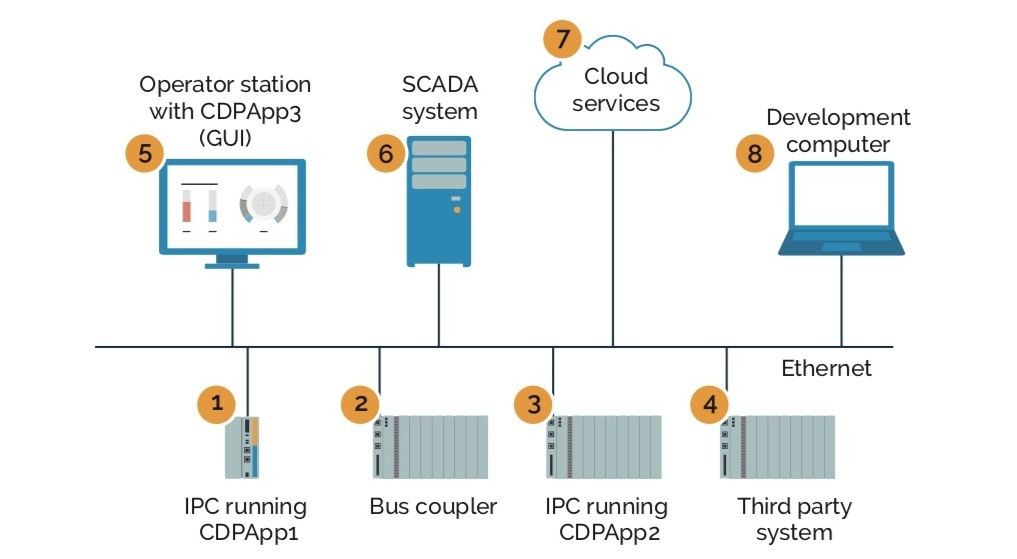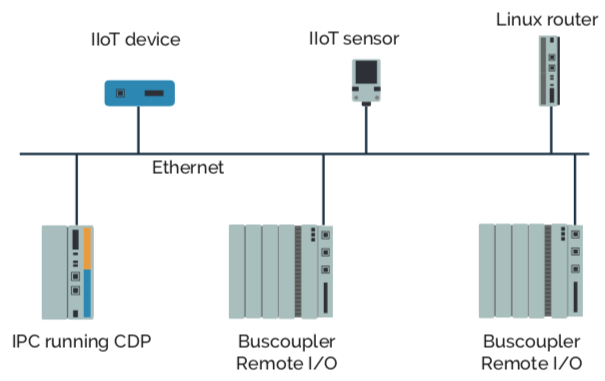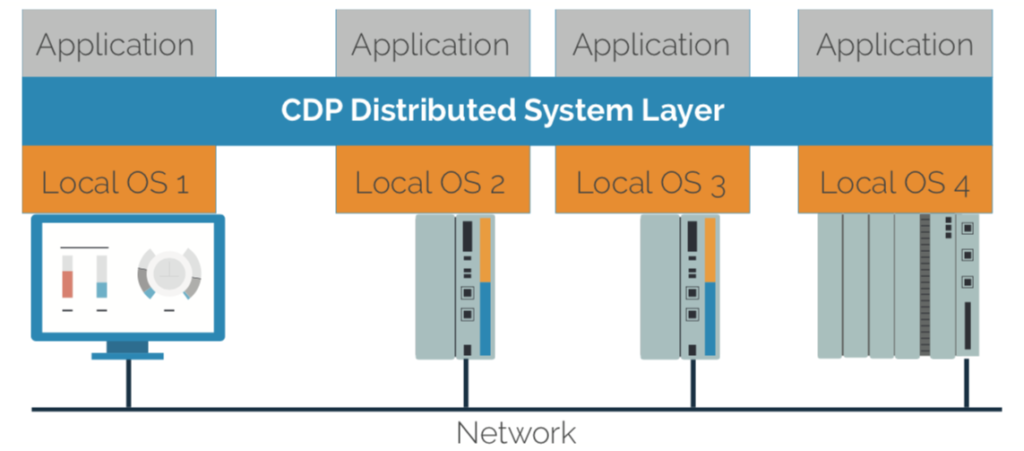
CDP Studio works with Industrial PCs, Hybrid PLC controllers, remote I/O and IIOT/IOT devices. CDP Studio enables:
- Independent of hardware vendors
- Works across device types
- Multiple industries and application areas
- Scalable from a single controller to distributed industrial control systems
- Utilise the power of industrial computers
A control system built with CDP Studio
Explanation to the above figure:
- IPC running control system application, CDPApp1
- Remote I/O accessible to all CDP Studio control application in the system
- Hybrid PLC/IPC with stacked I/O running control system application, CDPApp2
- A third-party PLC system (non-CDP Studio based) connected to the CDP Studio control applications with Modbus, MQTT.
- Panel PC running a CDP Studio GUI application, CDPApp3 providing operator access to the entire system
- Passing data to and from a Scada system
- Passing data to and from cloud services
- CDP Studio IDE developer station with local connection or remote access
Industrial PCs (IPC) and standard PCs
CDP Studio control systems run on most IPC/PC from a number of vendors with Linux or Windows operating systems. Both Intel and ARM architectures are supported.
The control system can access devices directly in the IPC, using remote I/O, or over the network for IIOT devices using the included industrial communication protocols (Ethernet, Modbus, CANopen, MQTT..)

Remote I/O modules
Remote I/O modules with your CDP control system
When you run the control system on an IPC you use a remote I/O module to access the different I/O units. A remote I/O module is a network enabled I/O interface module and these are offered by many different suppliers. These modules are often called buscouplers, but can also be a low-cost PLC. Individual I/O modules are typically stacked directly onto a buscoupler.
The CDP Studio control system communicates with the buscouplers using standard industrial protocols such as Modbus, CANopen, MQTT or plain UDP. The remote I/O can be located on physically different location in the network due to the distributed nature of CDP applications.
Integrated and preconfigured I/O modules
CDP Studio comes with a number of pre-configured buscouplers and I/O modules from various suppliers. These are available with easy drag and drop from the user interface.
I/O modules not preconfigured in CDP Studio
CDP Studio supports I/O modules that are not preconfigured in CDP Studio. There are 2 methods, either configure the included generic I/O module adapter (called IOServer) or create your custom I/O server. Custom I/O servers can utilize the full potential of C++ to interface any kind of communication protocol. CDP Technologies can provide custom implementations on request.
Hybrid PLC/IPC controllers
Hardware vendors are starting to provide controller units that are a combination of a Programmable Logic Controller (PLC) and an IPC, bridging the gap between traditional PLCs and more powerful IPCs. The I/O modules are typically stacked directly onto these controller units.
CDP Studio comes with preconfigured support for Wago PFC100 and PFC200 from the 750-series, and other vendors will be added as vendors release these controllers. CDP Technologies can provide hybrid PLC/IPC support on request.
IIOT and IOT devices
CDP Studio supports Industry Internet of Things (IIOT) and Internet of Things (IOT) devices and sensors. These can be connected to a CDP Studio control system using MQTT, UDP or any of the industrial protocols.
Features of CDP Studio
Simplified development environment setup
CDP Studio comes with all necessary functionality that greatly simplifies the use of different hardware vendors and types. CDP Studio automatically installs the correct environment and ensures that your project uses the correct toolchain with the right environment paths, compilers, linkers, plugins, and so forth.
Cross-compilation
CDP Studio allows you to work in a Windows or a Linux environment independently of which operating system the actual control system shall run on. The cross- compilation feature allows you to work in Windows and deploy your runtime applications to a Linux controller or vice versa. CDP Studio abstracts your application development from the operating system allowing you to be highly flexible in developing and testing automation systems.
Distributed control systems
CDP Studio control systems can be distributed over any number of physical units. The inherent named based routing features in CDP Studio allows you to create highly distributed control systems. The system logic is separate from physical distribution, which permits you to group functionalities and define distribution in accordance with the hardware capacity and cost. CDP Studio’s flexibility allows you to run a system in a multivendor environment combining IPCs, hybrid PLC/PC controllers, remote I/O modules and individual sensors in the same system.

Remote access and deployment
CDP Studio offers a plugin allowing you to connect to a CDP Studio control system located in remote network locations.
The remote access plugin is a powerful tool that gives remote access to your control system with the full feature set of CDP Studio IDE enabled. The real-time access is an efficient service tool allowing you to configure, analyse, debug and deploy applications from the office.
This information can also be downloaded as a formatted white paper.